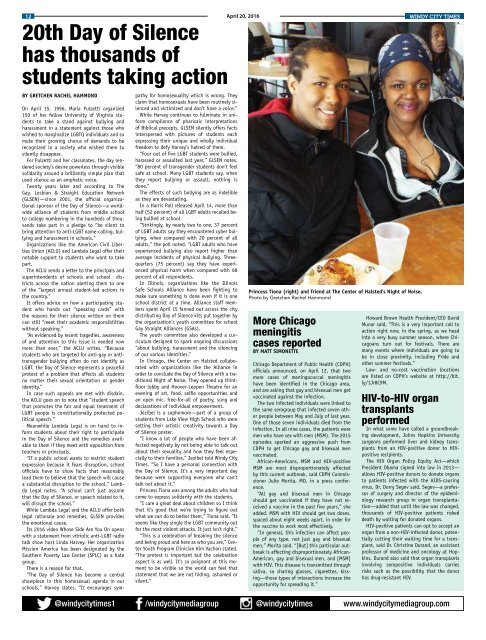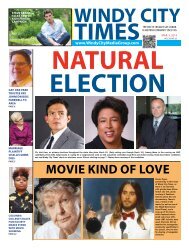BLAZING TRAILS
4mTYk3
4mTYk3
Create successful ePaper yourself
Turn your PDF publications into a flip-book with our unique Google optimized e-Paper software.
12 April 20, 2016<br />
WINDY CITY TIMES<br />
20th Day of Silence<br />
has thousands of<br />
students taking action<br />
By Gretchen Rachel Hammond<br />
On April 15, 1996, Maria Pulzetti organized<br />
150 of her fellow University of Virginia students<br />
to take a stand against bullying and<br />
harassment in a statement against those who<br />
wished to marginalize LGBTQ individuals and so<br />
mute their growing chorus of demands to be<br />
recognized in a society who wished them to<br />
silently disappear.<br />
For Pulzetti and her classmates, the day rendered<br />
society’s desire powerless through visible<br />
solidarity around a brilliantly simple plan that<br />
used silence as an emphatic voice.<br />
Twenty years later and according to The<br />
Gay, Lesbian & Straight Education Network<br />
(GLSEN)—since 2001, the official organizational<br />
sponsor of the Day of Silence—a worldwide<br />
alliance of students from middle school<br />
to college numbering in the hundreds of thousands<br />
take part in a pledge to “be silent to<br />
bring attention to anti-LGBT name-calling, bullying<br />
and harassment in schools.”<br />
Organizations like the American Civil Liberties<br />
Union (ACLU) and Lambda Legal offer their<br />
notable support to students who want to take<br />
part.<br />
The ACLU sends a letter to the principals and<br />
superintendents of schools and school districts<br />
across the nation alerting them to one<br />
of the “largest annual student-led actions in<br />
the country.”<br />
It offers advice on how a participating student<br />
who hands out “speaking cards” with<br />
the reasons for their silence written on them<br />
can still “meet their academic responsibilities<br />
without speaking.”<br />
“As evidenced by recent tragedies, awareness<br />
of and attention to this issue is needed now<br />
more than ever,” the ACLU writes. “Because<br />
students who are targeted for anti-gay or antitransgender<br />
bullying often do not identify as<br />
LGBT, the Day of Silence represents a peaceful<br />
protest of a problem that affects all students<br />
no matter their sexual orientation or gender<br />
identity.”<br />
In case such appeals are met with disdain,<br />
the ACLU goes on to note that “student speech<br />
that promotes the fair and equal treatment of<br />
LGBT people is constitutionally protected political<br />
speech.”<br />
Meanwhile Lambda Legal is on hand to inform<br />
students about their right to participate<br />
in the Day of Silence and the remedies available<br />
to them if they meet with opposition from<br />
teachers or principals.<br />
“If a public school wants to restrict student<br />
expression because it fears disruption, school<br />
officials have to show facts that reasonably<br />
lead them to believe that the speech will cause<br />
a substantial disruption to the school,” Lambda<br />
Legal notes. “A school can’t just assume<br />
that the Day of Silence, or speech related to it,<br />
will disrupt the school.”<br />
While Lambda Legal and the ACLU offer both<br />
legal rationale and remedies, GLSEN provides<br />
the emotional cause.<br />
Its 2016 video Whose Side Are You On opens<br />
with a statement from vitriolic anti-LGBT radio<br />
talk show host Linda Harvey. Her organization<br />
Mission America has been designated by the<br />
Southern Poverty Law Center (SPLC) as a hate<br />
group.<br />
There is a reason for that.<br />
“The Day of Silence has become a central<br />
showpiece in this homosexual agenda in our<br />
schools,” Harvey states. “It encourages sympathy<br />
for homosexuality which is wrong. They<br />
claim that homosexuals have been routinely silenced<br />
and victimized and don’t have a voice.”<br />
While Harvey continues to fulminate in uniform<br />
compliance of pharisaic interpretations<br />
of Biblical precepts, GLSEN silently offers facts<br />
interspersed with pictures of students each<br />
expressing their unique and wholly individual<br />
freedom to defy Harvey’s hatred of them.<br />
“Four out of five LGBT students were bullied,<br />
harassed or assaulted last year,” GLSEN notes.<br />
“80 percent of transgender students don’t feel<br />
safe at school. Many LGBT students say, when<br />
they report bullying or assault, nothing is<br />
done.”<br />
The effects of such bullying are as indelible<br />
as they are devastating.<br />
In a Harris Poll released April 14, more than<br />
half (52 percent) of all LGBT adults recalled being<br />
bullied at school.<br />
“Strikingly, by nearly two to one, 37 percent<br />
of LGBT adults say they encountered cyber bullying,<br />
when compared with 20 percent of all<br />
adults,” the poll noted. “LGBT adults who have<br />
experienced bullying also report higher than<br />
average incidents of physical bullying. Threequarters<br />
(75 percent) say they have experienced<br />
physical harm when compared with 68<br />
percent of all respondents.<br />
In Illinois, organizations like the Illinois<br />
Safe Schools Alliance have been fighting to<br />
make sure something is done even if it is one<br />
school district at a time. Alliance staff members<br />
spent April 15 fanned out across the city<br />
distributing Day of Silence kits put together by<br />
the organization’s youth committee for school<br />
Gay Straight Alliances (GSAs).<br />
The youth committee also developed a curriculum<br />
designed to spark ongoing discussions<br />
“about bullying, harassment and the silencing<br />
of our various identities.”<br />
In Chicago, the Center on Halsted collaborated<br />
with organizations like the Alliance in<br />
order to conclude the Day of Silence with a traditional<br />
Night of Noise. They opened up thirdfloor<br />
lobby and Hoover-Leppen Theatre for an<br />
evening of art, food, selfie opportunities and<br />
an open mic. free-for-all of poetry, song and<br />
declarations of individual empowerment.<br />
Jezibel is a sophomore—part of a group of<br />
students from Lake View High School who were<br />
setting their artistic creativity towards a Day<br />
of Silence poster.<br />
“I know a lot of people who have been affected<br />
negatively by not being able to talk out<br />
about their sexuality and how they feel especially<br />
to their families,” Jezibel told Windy City<br />
Times. “So I have a personal connection with<br />
the Day of Silence. It’s a very important day<br />
because were supporting everyone who can’t<br />
talk out about it.”<br />
Princess Tiona was among the adults who had<br />
come to express solidarity with the students.<br />
“I care a great deal about children so I think<br />
that it’s good that we’re trying to figure out<br />
what we can do to better them,” Tiona said. “It<br />
seems like they single the LGBT community out<br />
for the most violent attacks. It just isn’t right.”<br />
“This is a celebration of breaking the silence<br />
and being proud and here as who you are,” Center<br />
Youth Program Clinician Kim Vachon stated.<br />
“The protest is important but the celebration<br />
aspect is as well. It’s so poignant at this moment<br />
to be visible so the world can feel that<br />
statement that we are not hiding, ashamed or<br />
silent.”<br />
Princess Tiona (right) and friend at The Center of Halsted’s Night of Noise.<br />
Photo by Gretchen Rachel Hammond<br />
More Chicago<br />
meningitis<br />
cases reported<br />
By Matt Simonette<br />
Chicago Department of Public Health (CDPH)<br />
officials announced, on April 12, that two<br />
more cases of meningococcal meningitis<br />
have been identified in the Chicago area,<br />
and are asking that gay and bisexual men get<br />
vaccinated against the infection.<br />
The two infected individuals were linked to<br />
the same serogroup that infected seven other<br />
people between May and July of last year.<br />
One of those seven individuals died from the<br />
infection. In all nine cases, the patients were<br />
men who have sex with men (MSM). The 2015<br />
episodes sparked an aggressive push from<br />
CDPH to get Chicago gay and bisexual men<br />
vaccinated.<br />
African-Americans, MSM and HIV-positive<br />
MSM are most disproportionately affected<br />
by this current outbreak, said CDPH Commissioner<br />
Julie Morita, MD, in a press conference.<br />
“All gay and bisexual men in Chicago<br />
should get vaccinated if they have not received<br />
a vaccine in the past five years,” she<br />
added. MSM with HIV should get two doses,<br />
spaced about eight weeks apart, in order for<br />
the vaccine to work most effectively.<br />
“In general, this infection can affect people<br />
of any type, not just gay and bisexual<br />
men,” Morita said. “[But] this particular outbreak<br />
is affecting disproportionately African-<br />
American, gay and bisexual men, and [MSM]<br />
with HIV. This disease is transmitted through<br />
saliva, so sharing glasses, cigarettes, kissing—those<br />
types of interactions increase the<br />
opportunity for spreading it.”<br />
Howard Brown Health President/CEO David<br />
Munar said, “This is a very important call to<br />
action right now, in the spring, as we head<br />
into a very busy summer season, where Chicagoans<br />
turn out for festivals. There are<br />
many events where individuals are going to<br />
be in close proximity, including Pride and<br />
other summer festivals.”<br />
Low- and no-cost vaccination locations<br />
are listed on CDPH’s website at http://bit.<br />
ly/1Jr8C9M.<br />
HIV-to-HIV organ<br />
transplants<br />
performed<br />
In what some have called a groundbreaking<br />
development, Johns Hopkins University<br />
surgeons performed liver and kidney transplants<br />
from an HIV-positive donor to HIVpositive<br />
recipients.<br />
The HIV Organ Policy Equity Act—which<br />
President Obama signed into law in 2013—<br />
allows HIV-positive donors to donate organs<br />
to patients infected with the AIDS-causing<br />
virus, Dr. Dorry Segev said. Segev—a professor<br />
of surgery and director of the epidemiology<br />
research group in organ transplantation—added<br />
that until the law was changed,<br />
thousands of HIV-positive patients risked<br />
death by waiting for donated organs.<br />
HIV-positive patients can opt to accept an<br />
organ from a non-HIV-infected donor, potentially<br />
cutting their waiting time for a transplant,<br />
said Dr. Christine Durand, an assistant<br />
professor of medicine and oncology at Hopkins.<br />
Durand also said that organ transplants<br />
involving seropositive individuals carries<br />
risks such as the possibility that the donor<br />
has drug-resistant HIV.<br />
@windycitytimes1 /windycitymediagroup @windycitytimes www.windycitymediagroup.com




